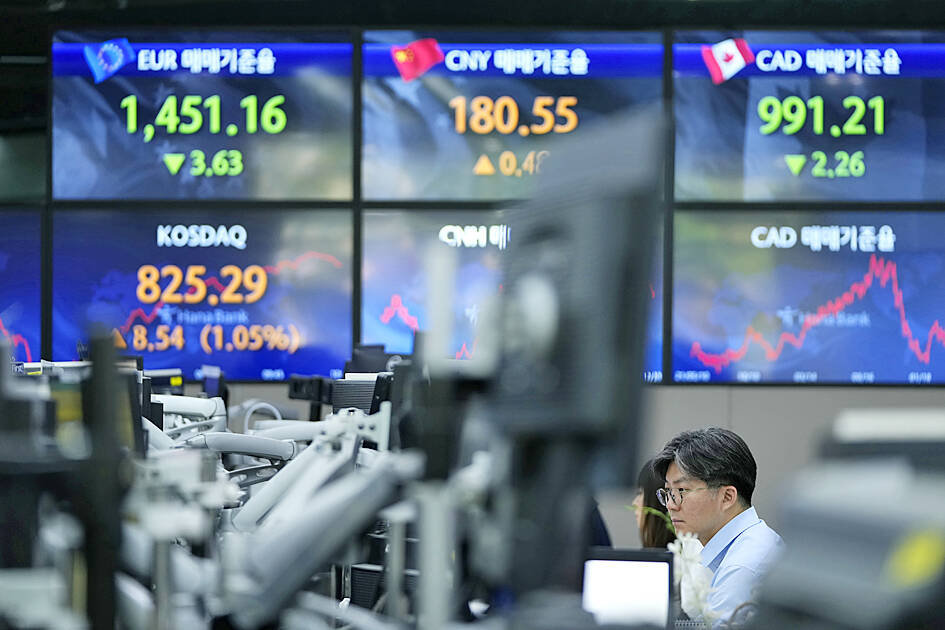Japan’s economy grew at an annual pace of 1.6 percent in the quarter through March as private demand rebounded after COVID-19 restrictions were eased, data released yesterday showed.
Real GDP, which measures the sum value of a nation’s products and services, grew 0.4 percent quarterly in the January-to-March period in the world’s third-largest economy, the Japanese Cabinet Office said.
That was the fastest pace of GDP growth since the 1.1 percent growth in the April-to-June period last year. It was also better than the market consensus forecast of 0.2 percent.

Photo: AP
Japan’s benchmark Nikkei 225 gained 0.8 percent to finish at 30,093.59 on the news of solid economic growth data.
The annualized pace shows what the growth would have been if what was marked during the quarter had continued for a year.
The biggest contributor to growth was private demand, surging an annual 3.1 percent, with consumer spending and private investment showing a healthy rebound. The recent opening of borders to tourists and other incoming travel has also helped consumption perk up.
Public demand grew at an annualized 1.8 percent.
“Japan’s economy appears to be on a gradual recovery track despite sluggish global demand,” ING Groep NV chief Asia Pacific economist Rob Carnell said
Some analysts think such signs of recovery will prompt Japan’s central bank to take action on a policy change and move toward higher interest rates.
The Bank of Japan policy board meets next month.
On the negative side, slowing exports dragged on growth, reflecting lagging global economies. Japan’s exports in the January-to-March period dropped an annualized 15.6 percent.
While much of the world, including Europe and the US, has been focused on inflationary pressures, Japan has been more cautious about its approach to inflation, because it has been hit by decades of the opposite problem: deflation, when prices spiral down.
Electricity bills were recently raised across the nation. Although that does not directly affect core inflation, the move is likely to have a trickle-down effect and boost inflation, analysts say.
The relatively positive read for the Japanese economy could even work toward supporting Japanese Prime Minister Fumio Kishida’s standing with the public, which has had its ups and downs. Speculation is simmering that Kishida might call a snap parliamentary election later this year.

Taiwan Semiconductor Manufacturing Co (TSMC, 台積電) would not produce its most advanced technologies in the US next year, Minister of Economic Affairs J.W. Kuo (郭智輝) said yesterday. Kuo made the comment during an appearance at the legislature, hours after the chipmaker announced that it would invest an additional US$100 billion to expand its manufacturing operations in the US. Asked by Taiwan People’s Party Legislator-at-large Chang Chi-kai (張啟楷) if TSMC would allow its most advanced technologies, the yet-to-be-released 2-nanometer and 1.6-nanometer processes, to go to the US in the near term, Kuo denied it. TSMC recently opened its first US factory, which produces 4-nanometer

PROTECTION: The investigation, which takes aim at exporters such as Canada, Germany and Brazil, came days after Trump unveiled tariff hikes on steel and aluminum products US President Donald Trump on Saturday ordered a probe into potential tariffs on lumber imports — a move threatening to stoke trade tensions — while also pushing for a domestic supply boost. Trump signed an executive order instructing US Secretary of Commerce Howard Lutnick to begin an investigation “to determine the effects on the national security of imports of timber, lumber and their derivative products.” The study might result in new tariffs being imposed, which would pile on top of existing levies. The investigation takes aim at exporters like Canada, Germany and Brazil, with White House officials earlier accusing these economies of

GREAT SUCCESS: Republican Senator Todd Young expressed surprise at Trump’s comments and said he expects the administration to keep the program running US lawmakers who helped secure billions of dollars in subsidies for domestic semiconductor manufacturing rejected US President Donald Trump’s call to revoke the 2022 CHIPS and Science Act, signaling that any repeal effort in the US Congress would fall short. US Senate Minority Leader Chuck Schumer, who negotiated the law, on Wednesday said that Trump’s demand would fail, while a top Republican proponent, US Senator Todd Young, expressed surprise at the president’s comments and said he expects the administration to keep the program running. The CHIPS Act is “essential for America leading the world in tech, leading the world in AI [artificial

REACTIONS: While most analysts were positive about TSMC’s investment, one said the US expansion could disrupt the company’s supply-demand balance Taiwan Semiconductor Manufacturing Co’s (TSMC, 台積電) new US$100 billion investment in the US would exert a positive effect on the chipmaker’s revenue in the medium term on the back of booming artificial intelligence (AI) chip demand from US chip designers, an International Data Corp (IDC) analyst said yesterday. “This is good for TSMC in terms of business expansion, as its major clients for advanced chips are US chip designers,” IDC senior semiconductor research manager Galen Zeng (曾冠瑋) said by telephone yesterday. “Besides, those US companies all consider supply chain resilience a business imperative,” Zeng said. That meant local supply would